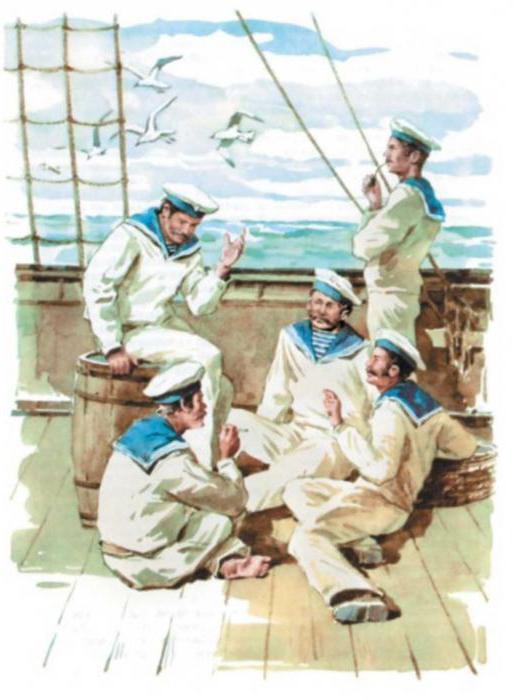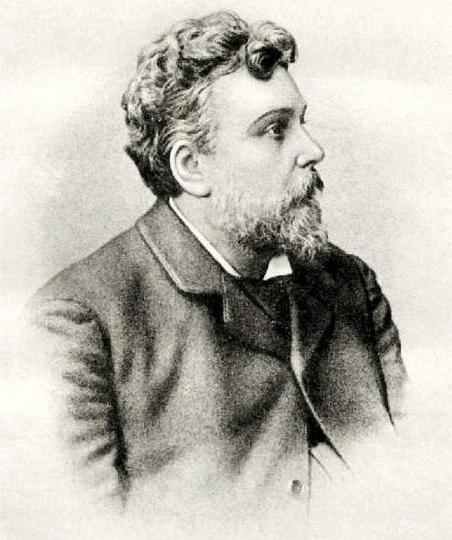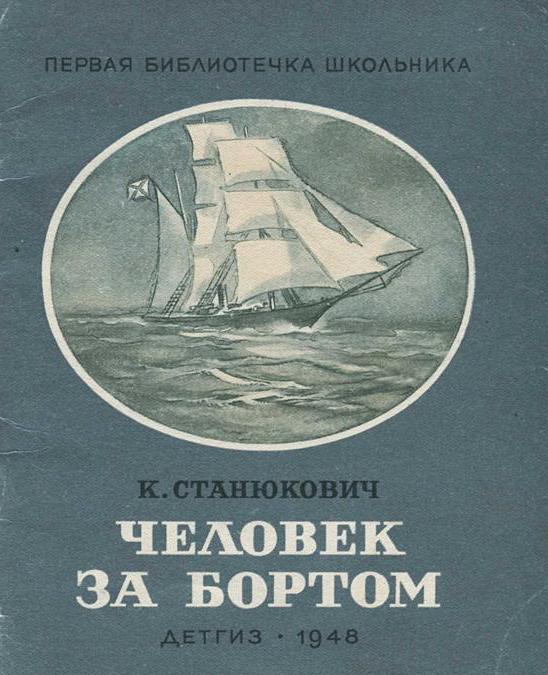In Russian literature, this name is inextricably linked with the genre of marine painters. It has become almost commonplace to say that in Russian art there are two unsurpassed singers of the sea element, equal in talent: in painting - Ivan Aivazovsky, in literature - Stanyukovich. Konstantin Mikhailovich came from a family of hereditary sailors.
It would seem, what else could he write about, having successfully begun the career of a naval officer, when he felt a craving for literary work? Meanwhile, he found his main topic far from immediately.
Admiral's son
He was born in 1843 in the city that personified the maritime glory of Russia - in Sevastopol. Father - Admiral Mikhail Nikolayevich Stanyukovich - served as military governor and commandant of the Sevastopol military port. The “terrible admiral,” as his son-writer would later call him, considered naval service the best thing for a man, strict military order was the most correct way of organizing life, suitable for a family. A descendant of the ancient Polish-Lithuanian noble family of the Stankovichi, he possessed an iron will and strong character. Marine business was an ancient family tradition: even his wife Lyubov Fedorovna was the daughter of a naval officer.
The dynasty should be continued - Admiral Stanyukovich was convinced of this. Konstantin Mikhailovich, who was a brisk and quick-witted child since childhood, has become the father’s main hope in this regard. He took measures for the initial education of his son, having assigned to him as a mentor and home teacher a well-educated person who came from the Petersburg intelligentsia Ippolit Matveyevich Debu. He was exiled to serve as an ordinary soldier, after serving the exile. The exile was an alternative to the death penalty in the case of Petrashevsky (1949), a liberal circle of young socialists led by Mikhail Butashevich-Petrashevsky, where F. M. Dostoevsky was a comrade in the circle. He did not inspire his ten-year-old student with his radical views, but instilled in him a taste for good literature.
Medal for the defense of Sevastopol
In 1853, the Crimean War began, which became a symbol of the social problems accumulated in Russia related to the incompetent policies of the autocracy, stifling the hopes of the advanced layers of the people for the reforms that were expected after the victory in the 1812 war. This will then spill over into the revolutionary movement of the 1860s, whose influence cannot be avoided by Stanyukovich. Konstantin Mikhailovich will sympathize with reformist ideas, and while he is 11 years old, and he observes the Anglo-French troops approaching Sevastopol.
During the defense of the city, Konstantin is with his father and often fulfills the duties of a courier, delivers medicine to the dressing station, etc. He witnesses with his own eyes the heroism of the Russian sailors and the tragedy of the surrender of the city, sees the legendary leaders of the defense - Admirals Kornilova and Istomina. When, after evacuating from the besieged base of the Black Sea Fleet in 1856, he enters the Petersburg Page Corps, he receives medals there in memory of the Eastern War and For Defense of Sevastopol. At the request of his father, who dreams of a son’s naval career, in 1857 Stanyukovich became a cadet of the Marine Corps.
The end of an officer career
By the early 1860s, he was already infected with a passion for word creation. In 1859, the Northern Flower magazine was published with its first publication, the poem Retired Soldier. A year later, a conflict breaks out between Konstantin Mikhailovich and his father, which laid the foundation for the coldness in their relationship, which will end after a while with a complete break. The son announces his decision to transfer to a civilian educational institution - to St. Petersburg University, against which Admiral Stanyukovich sharply objects. Konstantin Mikhailovich will be forced to go on a round-the-world trip on the Kalevala corvette, to the crew of which he will be enlisted at the insistence of his father in the fall of 1860.

The old sailor hopes that in the strong ocean wind his son’s head will be cleansed of all kinds of nonsense, and the dynasty of naval commanders of the Stanyukovichs will continue. But for Konstantin, participating in a three-year round-the-world world is just a way to gain new knowledge and impressions for his writing work. And it has already begun: articles and essays of the midshipman Stanyukovich are printed in the popular edition “Marine Collection”, and in his free time he tirelessly writes down his impressions of what he saw and heard.
Retirement
In 1864, midshipman Stanyukovich, having overcome the active opposition of his father, quits the fleet. The beginning of a new life is not easy. He begins active cooperation with various publications - “The Voice”, “Petersburg Leaf”, “Alarm Clock”, etc. The story by Konstantin Stanyukovich “The Storm” is published in the “Marine Collection”. But soon marriage follows Lyubov Nikolayevna Artseulova, then the birth of the first daughter, and the young writer faces the task of decent material support for the family. To do this, he enters service in various departments several times.

In creative terms, for Stanyukovich, the search for style and the main theme continues. Although his impressions of the maritime service, published as a separate book in 1867 entitled “From Around the World,” were met with interest, he was more and more imbued with the desire to write on socio-political topics. He feels the correctness of the ideas expressed by the inspirers of the revolutionary movement, which is gaining more and more strength, especially its radical wing - populism. At one time, he even worked as a teacher in an elementary school in one of the villages of Murom county.
Editor of Delo Magazine
Gradually, the marine theme fades into the background. Since 1872, Stanyukovich began to work actively in the journal Delo, and since 1877 his articles and feuilletons were published in every issue. Among them are “Letters of a noble foreigner” and “Pictures of public life”, which bring Stanyukovich famous for being a harsh critic of Russian reality after the reforms of 1861. The novels Omut and Two Brothers, published in the early 80s, are devoted to similar topics.
In 1880, Stanyukovich became one of the editors of The Cause, and three years later - its chief editor. He already has a certain weight and authority among the supporters of revolutionary transformations, and is characterized by the official authority and police authorities as “the personality of an anti-government way of thinking”.
Arrest and exile
In the early 80's, the writer went abroad several times in connection with the illness of his eldest daughter. There he meets with a group of political emigrants from Russia, including the most radical of the kind, among whom were the Volunteers - direct participants and organizers of the attacks against prominent tsarist officials - S. Kravchinsky, V. Zasulich and others.
This could not pass by the attention of the police, especially after the assassination attempt on March 1, 1881 of Alexander II, and in April 1884 Stanyukovich was arrested and placed in the casemates of the Peter and Paul Fortress. This happened when the writer returned from abroad, completely unexpectedly, and the family did not know about his whereabouts for some time. A long inquiry begins, ending only after a year.
Second birth
In 1885, the writer was sent to Siberia for three years under police supervision and settled in Tomsk. Here the real birth of the great writer-marinist took place. He works hard, and creates works with descriptions of Siberian life, but the life of military sailors becomes the main theme of his tales and stories.
His famous masterpieces from the collection “Sea Tales” appear: “A Man Overboard!”, “On the Stones”, “Escape” and others. Readers and progressive critics noted that Stanyukovich’s prose is captivating not only with the spirit of marine romance, accuracy and authenticity in the most small details, but also a humanistic character, a desire for justice, attention to a simple person.
“He not only felt, he lived a marine life”
After returning from exile in 1888, Stanyukovich expects an enthusiastic reception in the capital, caused by the resounding success of his “Sea Tales”. Both professional sailors and men of letters speak positively of his collection. The first like the masterful display of difficult sea life, the second - a clear and intelligible language, the amazing novelty of the plot moves. Stories such as “Man Overboard!”, “Between His Own,” “Death of the Hawk,” and others, were noted for the accuracy of human characters, the truthfulness of actions, determined by the complexity of life circumstances. They are living people, whose significance does not depend on origin or education.

Positive feedback on the stories of Stanyukovich was published in publications of various political views. “Maximka”, “American Duel”, “Truly Russian Man” and other works found understanding among the Slavophiles, who admired the pride in them for the high moral qualities of the Russian sailors. The kindness, courage and recklessness of their whole soul had for them clear national sources. “Jack of Hearts”, “To Far Land”, according to others, contained heights of spirit that have universal value. The general opinion was that of the educational and educational value of Stanyukovich's prose.
Legacy and memory
The last years of the writer’s life were filled with hard work, the respect of colleagues, the love of readers, illnesses and the loss of loved ones. Konstantin Mikhailovich Stanyukovich, whose biography remained closely connected with Russia from the first to the last breath, died in Naples, in 1903.
He is not considered a genius of Russian literature at the level of Tolstoy, Dostoevsky or Chekhov, but without the prose of Stanyukovich pierced by the sea winds, Russian literature of the 19th century would have lost a significant part of its breadth and versatility. And in our time, adults and children are fond of it, films are made according to the stories and stories of the great marine painter, and today they call into the sea of future sailors.